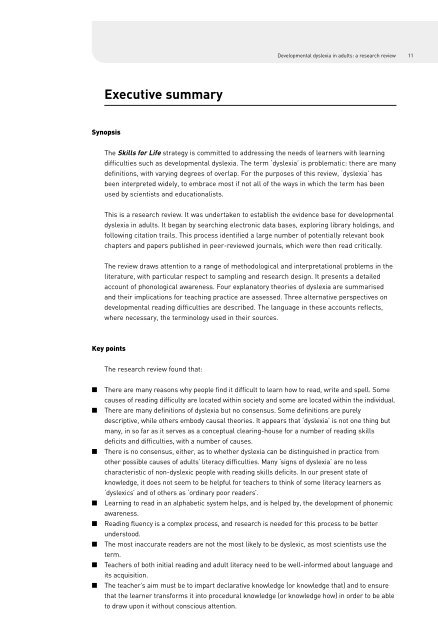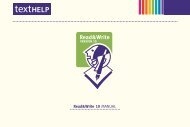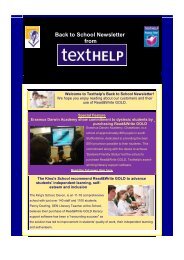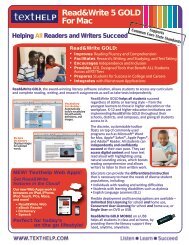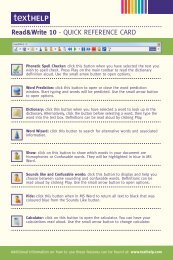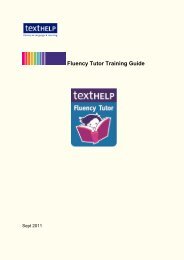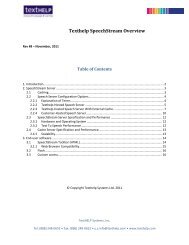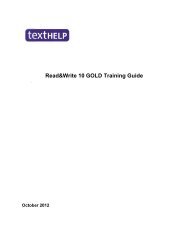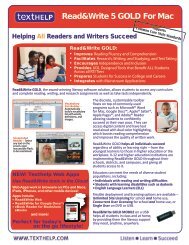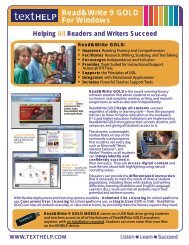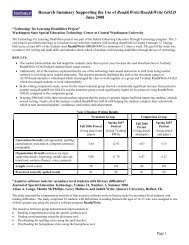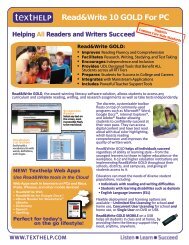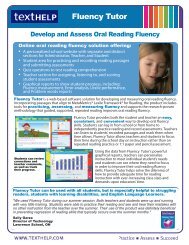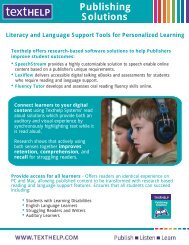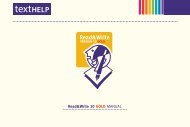01 NRDC Dyslexia 1-88 update - Texthelp
01 NRDC Dyslexia 1-88 update - Texthelp
01 NRDC Dyslexia 1-88 update - Texthelp
Create successful ePaper yourself
Turn your PDF publications into a flip-book with our unique Google optimized e-Paper software.
Developmental dyslexia in adults: a research review 11<br />
Executive summary<br />
Synopsis<br />
The Skills for Life strategy is committed to addressing the needs of learners with learning<br />
difficulties such as developmental dyslexia. The term ‘dyslexia’ is problematic: there are many<br />
definitions, with varying degrees of overlap. For the purposes of this review, ‘dyslexia’ has<br />
been interpreted widely, to embrace most if not all of the ways in which the term has been<br />
used by scientists and educationalists.<br />
This is a research review. It was undertaken to establish the evidence base for developmental<br />
dyslexia in adults. It began by searching electronic data bases, exploring library holdings, and<br />
following citation trails. This process identified a large number of potentially relevant book<br />
chapters and papers published in peer-reviewed journals, which were then read critically.<br />
The review draws attention to a range of methodological and interpretational problems in the<br />
literature, with particular respect to sampling and research design. It presents a detailed<br />
account of phonological awareness. Four explanatory theories of dyslexia are summarised<br />
and their implications for teaching practice are assessed. Three alternative perspectives on<br />
developmental reading difficulties are described. The language in these accounts reflects,<br />
where necessary, the terminology used in their sources.<br />
Key points<br />
The research review found that:<br />
■<br />
■<br />
■<br />
■<br />
■<br />
■<br />
■<br />
■<br />
There are many reasons why people find it difficult to learn how to read, write and spell. Some<br />
causes of reading difficulty are located within society and some are located within the individual.<br />
There are many definitions of dyslexia but no consensus. Some definitions are purely<br />
descriptive, while others embody causal theories. It appears that ‘dyslexia’ is not one thing but<br />
many, in so far as it serves as a conceptual clearing-house for a number of reading skills<br />
deficits and difficulties, with a number of causes.<br />
There is no consensus, either, as to whether dyslexia can be distinguished in practice from<br />
other possible causes of adults’ literacy difficulties. Many ‘signs of dyslexia’ are no less<br />
characteristic of non-dyslexic people with reading skills deficits. In our present state of<br />
knowledge, it does not seem to be helpful for teachers to think of some literacy learners as<br />
‘dyslexics’ and of others as ‘ordinary poor readers’.<br />
Learning to read in an alphabetic system helps, and is helped by, the development of phonemic<br />
awareness.<br />
Reading fluency is a complex process, and research is needed for this process to be better<br />
understood.<br />
The most inaccurate readers are not the most likely to be dyslexic, as most scientists use the<br />
term.<br />
Teachers of both initial reading and adult literacy need to be well-informed about language and<br />
its acquisition.<br />
The teacher’s aim must be to impart declarative knowledge (or knowledge that) and to ensure<br />
that the learner transforms it into procedural knowledge (or knowledge how) in order to be able<br />
to draw upon it without conscious attention.


